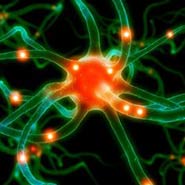Stafford Lightman, Professor of Medicine, said the programme would open up new avenues of research: “This new development will be a landmark for the training of a new cadre of scientists who will be able to work on neuroscience problems underpinned with a knowledge of applied mathematics.”
The course, which will be open to four students per year between 2011 and 2015, has been made possible by funding from the Wellcome Trust, which received a total of 60 submissions for the award of just four new programmes nationwide. The programme, entitled ‘Neural dynamics: from synapses to systems in health and disease’, will combine the expertise of several faculties in Bristol, namely Medical and Veterinary Sciences, Engineering and Medicine and Dentistry, and also the Bristol Neuroscience network.
Zafar Bashir, Professor of Cellular Neuroscience, said: “By developing cross-disciplinary expertise in advanced experimental methods, combined with advanced analytical methods, the programme will build capacity in an area where academia, industry and government all recognise that there is a critical skills shortage in the UK and worldwide.”
The PhD builds on Bristol’s globally acclaimed reputation in neuroscience and will enable the University to foster more links with key industrial partners.
Richard Apps, Professor of Neuroscience, said: “This is a major boost to neuroscience research at Bristol and together with our postgraduate programmes funded by the BBSRC, EU and the MRC, places Bristol at the forefront of neuroscience training in the UK.”
Dr Rafal Bogacz, Senior Lecturer in Computer Science, added: “Bristol has great research expertise in both experimental neuroscience and mathematics and computer science, and the programme will strengthen the collaboration between them. Mathematical modelling of neuroscience problems invariably results in novel concepts of understanding of the processes underlying neuronal regulation, not only at the individual cell level but also at the network level.”
